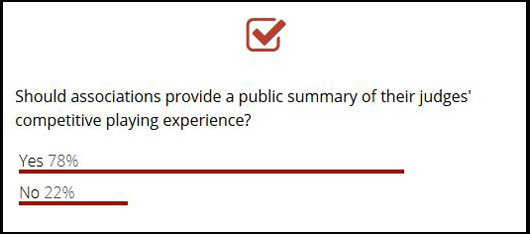Editorial: Criteria to critique
 When a piper, drummer or pipe band competes, they expect the judge or judges to have proven successful competition experience at a high level.
When a piper, drummer or pipe band competes, they expect the judge or judges to have proven successful competition experience at a high level.
It’s called “minimum criteria” – the years of competition experience and success a prospective judge must have before he or she can sit an accreditation exam.
Associations have varying definitions of minimum criteria. However, for most, those adjudicating at the top levels require a number of years (generally between five and 15) of “successful” competition experience in the very top grade. Whatever you might think of the actual testing process – whether it is actually necessary or proves much of anything – is, as always, up for debate.
One of the most important attributes that a judge has is his or her years of experience. They have walked the talk. They have spent years on the other side of the bench or clipboard. It is a guarantee to competitors that the person passing judgment on you has not just stood in your ghillies, but has done so to a consistent standard measured in prize winning. It gains your trust that he or she has done the business.
The major associations around the world all have minimum criteria. They are not supposed to entertain an applicant or approach a candidate who does not meet that base-level criteria. But sometimes, for some reason, some people somehow slip through. They might have toiled for some years in “the open” (as they would be prone to calling it) with almost no success in contests of significant merit. The prizes they list on their applications are from events attended by only a handful of competitors, and no one bothers to check or call them on it.
Or they might be great at pontificating on pipe bands, yet their band pedigree amounts to only a few years in a local starter band and maybe two in the top grade — far from the years at the top that are the required criteria. Years later, it’s difficult to unravel how they finagled their way in, and revoking their accreditation is unlikely at best.
Worse still are the ones who get through because a friend in a powerful place works it for them, or those who have the years of successful competing experience waived for the absolutely ludicrous rationale that, “we need more judges.”

Yes, we know for a fact that, somewhere, all of these unfortunate instances have occurred at least once. In some associations they might even be common.
While the RSPBA addressed the accreditation issue a long time ago, running a stringent system of criteria, testing and training, the Scottish solo scene continues to lack an accreditation system. It is only a matter of time, though, before such a program comes to fruition. When it does, they will no doubt consider the comprehensive and successful testing processes implemented around the world.
Before they embark on testing procedures, they would be well advised to set stringent prerequisite criteria for candidates. If they have not done the business well and successfully at the top level for many years, they should not be allowed in the door. Nothing personal. All nice people. But there should be no turning a blind eye. No “grandfathering” of existing judges who never done the business. Take a hard line.
A judge without the minimum years of proven competition success will never get the full respect of competitors. If the judge isn’t taken seriously, the results won’t be taken seriously.
But apart from trusting their associations to adhere to their own criteria and rules, how can competitors know that those who judge them actually meet the experience criteria? Well, it’s all about transparency:
- Associations should create a section of their website that profiles each adjudicator, when they sat the exam(s), their accreditation level, and a biographical sketch that shows that they met the prerequisite criteria that allowed them to take the exam.
- Provide a record of the professional development and contributions to piping and drumming each judge has made since becoming accredited.
- List all students and/or bands that each judge works with to provide public disclosure of perceived or real conflict-of-interest.
- Vet all of the above so that a judge’s claims are reasonably verified, and any omissions are corrected.
That might sound like a lot of work, but competitors deserve it. What’s more, according to our poll, they appear to want it. And, remember, judges and associations exist to serve the competitor-members first.
No matter what you might think of judging tests and training, it is the minimum criteria that is the greatest reassurance to competitors that the person who is about to pass judgment on you has walked the talk, and thus has credibility. Competitors need to be able to know who’s judging them. Meeting and, preferably, exceeding that criteria is the single most important factor in earning the respect of the competitor. Eloquent scoresheets can never replace successful and meaningful competition experience. Talking a good tune can’t replace years of competition cred.
If a judge is not respected by those competing, the results are pointless. It all starts with minimum criteria for eligibility gained through decades of commitment to honing the competitive art and craft with proven success, and providing transparent access for competitors to that and other information. Anything less is unacceptable.

I absolutely agree with the “intent” of this editorial.
There was a time when the EUSPBA had well defined pre-requisites for sitting any judges’ exam. When I sat the exam for solo piping in 1989, a judge candidate had to have ten years of PRIZE WINNING experience at the open/professional level. Over the years, that requirement has disappeared…
Ensemble pre-requisite? When I sat this particular exam, one had to have held a LEADERSHIP position in a grade 2 or higher pipe band. Today, one only has to have been on the panel for two years.
Some might argue a successful ensemble judge candidate must still pass a test and be able to write meaningful (?) score sheets. But who is writing the exam and who is evaluating the apprentice sheets? It doesn’t really matter since the fact remains an EUSPBA certified ensemble judge could have little or NO pre-requisite pipe band playing experience at any level.
I fully understand there is a need to be “flexible” with some pre-requisites. The EUSPBA is geographically quite large. There are currently no grade 1 pipe bands and only 5 grade 2 bands registered for the 2018 season. For this reason, “case by case” exceptions to certain playing pre-requisites are necessary. My concern is what group of bona fide experts are making the case by case exceptions?
I do not believe there is an easy fix to this perceived dilemma. However, I do believe it is time that judges take the bull by the horns and, leaving their egos, prejudices, etc. at the door, sit down together and decide what they are going to do to correct the situation.
Thanks for your thoughts. Just to be clear(er) — the intent of the piece is transparency. By simply outlining each judge’s competitive playing career in a section on their website, competing members will have a minimum degree of confidence that the judge has walked the talk. There are very few associations (if any) that do that.
My only concern (and I’ll admit, it is the concern of an outsider), is that the feedback loop of competitors>>Judges creates an echo chamber of acceptable performance styles. It is fascinating, the divide between living communities of musicians (call them “traditionalists”, maybe) and competition style performances grows as a result. And when someone from, say, Cape Breton plays their community’s style of strathspey at a competition, judges simply don’t know what to do with it.
Which may beg the larger question: when competitors state categorically that competitions are the reason the music exists, are they being fair or accurate? It may be a bit of an overstatement…